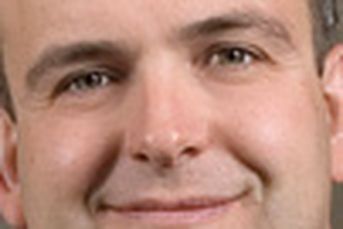Charles Goldman sues Schwab
Charles G. Goldman, who lost his position as head of Charles Schwab & Co.'s industry-leading business for independent investment advisers 18 months ago, has sued the company in federal court for more than $736,000 in severance pay and related benefits.
Charles G. Goldman, who lost his position as head of Charles Schwab & Co.’s industry-leading business for independent investment advisers 18 months ago, has sued the company in federal court for more than $736,000 in severance pay and related benefits.
In a suit filed last month in U.S. District Court in San Francisco, he accused Schwab executives of reneging on a severance agreement that he received the day he was laid off in November 2008. Mr. Goldman claims that Schwab backed out of the agreement a week later — after he informed the company that he would be joining a competitor.
Mr. Goldman, who made more than $2 million at Schwab in 2007, was told Nov. 17, 2008, that his job as executive vice president of institutional services had been eliminated in a reorganization. On Nov. 24, he informed Jay Allen, Schwab’s head of human resources, that he would join Fidelity Investments as head of its registered investment adviser and correspondent-clearing businesses.
“Mr. Allen and Schwab were looking for reasons to fire Mr. Goldman in retaliation for his obtaining new employment with Fidelity, Schwab’s chief competitor, but wanted to do so in a way that would prevent him from collecting severance benefits,” according to the complaint.
As a matter of policy, Schwab doesn’t comment on issues related to former employees, spokesman Greg Gable wrote in an e-mail. The company plans to file its response to Mr. Goldman’s complaint by Friday, according to a court filing.
Mr. Goldman worked at Schwab for nearly eight years. According to the suit, Schwab offered him severance pay equal to 16 months of his base pay (valued at $633,333), a lump-sum termination benefit of $79,167 to cover the 60 days he was to remain on the firm’s payroll after receiving his termination notice, and $23,754 in group health care benefits under COBRA.
Because Schwab entitles employees to severance if their jobs are eliminated and accelerates some payments if they find a job before their official termination date, it fabricated reasons to fire Mr. Goldman prior to his termination date of Feb. 13, 2009, according to the complaint.
Mr. Allen both verbally and in writing gave numerous reasons for denying Mr. Goldman’s severance benefits, most of which focused on his being fired for “cause,” according to the complaint. Schwab allegedly accused him of violating company policy by interviewing with Fidelity on company time in October 2008, of violating its gift policy by allowing Fidelity to pay for his plane fare from San Francisco to Boston and of taking a “side trip” to Boston without prior approval from his supervisor when he was supposed to be meeting with clients at a “round table” in Cincinnati.
Mr. Goldman appealed the denial of his severance package to a company review panel, which included Mr. Allen. Schwab turned down the appeal in August 2008, the suit claims.
“Mr. Goldman made significant efforts to resolve this issue but was unable to do so and was therefore forced to take this legal action,” said Russell Leibson, a lawyer in San Francisco who is representing the former Schwab executive. “Schwab wrongfully denied his claim for benefits under the plan after he joined Fidelity for reasons that are both frivolous and untrue.”
The complaint claims that the denial focused on Mr. Goldman’s alleged violation of human-resources and travel policies, including his reimbursement request for a $197 limousine ride to the San Francisco airport and an $11.87 lunch there on the day of his flight to Boston for his interview with Fidelity.
The panel also cited his e-mails, personal calendar and cell phone records to show that he, and possibly his wife, also traveled to Boston in April 2007 to search for housing, according to the complaint.
Mr. Goldman, who brought his claim for damages under provisions of ERISA, alleges that he was unable to respond comprehensively to the appeals panel, because he lacked access to data about his work schedules that resided on company computers or that Schwab had erased from his laptop and BlackBerry.
His suit claims that he put in full workdays even as he traveled to and from Boston. It also takes umbrage at the review panel’s suggestion that an executive of his rank should be subject to pre-approval of side trips or be constrained by time sheets.
Such scrutiny violates Schwab’s policy of treating senior executives as “valued contributors,” according to the lawsuit.
Mr. Goldman, who was 47 when he left Schwab, lost his position as president of institutional platforms at Fidelity in March 2010 after a reorganization at the company.
He joined Schwab in 2001 to run a venture capital unit and shifted to a strategy and corporate-development role as the discount-brokerage firm suffered from the dot-com bust. Mr. Goldman led a cost-cutting initiative in 2004 and 2005 that Schwab chief executive Walt Bettinger — who ultimately fired him — credited for aiding Schwab’s “financial turnaround.”
Mr. Goldman became head of the institutional unit for RIAs and their clients in 2007. That year, his division generated more client assets than any other part of Schwab, and its revenue jumped 11%.
According to Schwab’s proxy filing for 2007, the only year in which Mr. Goldman’s compensation was disclosed, he would have been entitled to about $2 million if he had been dismissed that year without cause. The bulk of the pay would have come from accelerated vesting of certain stock and option awards.
E-mail Jed Horowitz at [email protected].
Learn more about reprints and licensing for this article.




